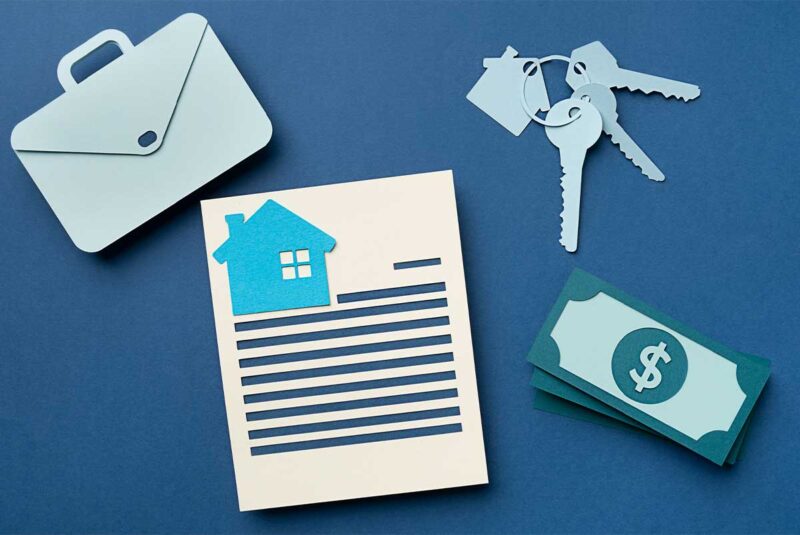Ready To Buy a Home?
Get Approved to Buy a Home
Rocket Mortgage® lets you get to house hunting sooner.
Most people don’t have the cash to purchase a home outright. They need to take out a loan to do it. That’s where mortgages come in.
Mortgages, also known as home loans, are different from other loan types because of the risk involved. These loans are typically worth hundreds of thousands of dollars, so lenders want to do their due diligence before issuing a loan.
This article will cover the factors mortgage lenders consider when reviewing an application, the minimum thresholds for these factors and tips for helping you meet them.
How To Qualify for a Mortgage
Explore Your Mortgage Options
What are you looking to do?
There are a few key areas mortgage lenders will hone in on when considering your application. They’ll look at your credit history, earning history, debts and down payment. They’ll also consider any additional relevant factors, like whether you have a co-signer or co-borrower or if you’ll receive gift money from a family member.
Below are the main metrics your mortgage lender will use. The better your numbers in these areas, the more likely you are to qualify for a mortgage with the lowest possible rates.
Improve your credit score
The higher your credit score, the better off you’ll be when it comes to applying for a home loan. Generally, the higher your number, the lower the rate you’ll qualify for, and the less you’ll pay in fees. Plus, depending on the type of loan you apply for, you may owe less of a down payment.
The links below include more information on credit scores:
- What credit score do you need to buy a house?
- How do you check your credit score for free?
- How do you improve your credit score?
Decrease your debt-to-income (DTI) ratio
Your income matters to mortgage lenders. So do your debts, and more specifically, what you owe on them each month. When you put those two things together, you get your debt-to-income (DT) ratio.
Here’s how to calculate it:
- Divide your gross annual salary (before taxes) by 12.
- Example: $55,000 / 12 = $4,583
- Then, take all of the monthly payments you owe each month and add them up. This includes things like student loans, car loans, rent, credit cards and so on.
- Example: $1,000 (rent) + $300 (student loans) + 300 (car payment) = $1,600.
- Take the second number (your total monthly debt) and divide it by the first number (your monthly gross).
- Example: 1,600 / 4,583 = 0.349
- Multiply the number you calculated by 100 to convert it to a percentage.
- Example: 0.349 X 100 = 34.9%
The lower your DTI ratio, the better your financial position in the eyes of lenders. We’ll go over the specific DTI ratio thresholds you need for different mortgage types later.
Take control of your financial well-being.
Your debt-to-income ratio can tell your mortgage eligibility and give you a picture of your financial health. Learn yours today.
Save up your down payment
The more you can save for your down payment, the better chance you’ll have of qualifying for a loan. A bigger down payment improves your loan-to-value (LTV) ratio, another important metric for lenders.
The minimum down payment you’ll need depends on the type of loan. Regardless, whatever loan type you choose, a larger down payment will reduce how much money you have to borrow overall. This will reduce your monthly payments, save you money on interest over the life of the loan and allow you to build equity faster, so it’s worth your while to put down as much as you can.
Choose a mortgage
The minimum requirements for the categories we’ve discussed will vary depending on the type of loan you choose. The vast majority of mortgages in the U.S. fall into one of two categories:
1. Conventional loans
These are mortgages that aren’t directly backed or insured by the government. They usually have higher requirements and lower fees than government-backed loans, which makes them a popular choice in the U.S. In fact, conventional loans accounted for 76% of new home purchases in 2022.[1]
There are two primary types of conventional loans:
- Fixed-rate loans: The interest rate doesn’t change over the life of the loan.
- Adjustable-rate mortgage (ARM): The interest rate on the loan changes periodically.
2. Government-backed loans
These mortgages are backed – meaning insured or guaranteed – by the U.S. government. That means if the borrower can’t pay back the loan, the government will step in and repay the investors who own the mortgages.
This helps offset some of the risk the investors take on, which allows lenders to offer loan options for those who can’t qualify for, or don’t want, a conventional mortgage.
Here are the most common government-backed loans:
- Federal Housing Administration (FHA) loans
- U.S. Department of Veterans Affairs (VA) loans
- U.S. Department of Agriculture (USDA) loans
Government home loans accounted for about 28% of home purchase loans in 2022.[2]
Can I Qualify for a Mortgage? Requirements by Loan Type
The chart below breaks down the requirements for each loan. You can click on the loan type to learn more about them, including additional requirements – such as property type or location restrictions.
| Loan Type | Minimum Credit Score | Maximum DTI Ratio | Minimum Down Payment |
| Conventional Loan | 620 for fixed-rate, 640 for ARM[3] | 36% preferred, up to 50% may be considered[4] | 5% (unless you meet specific requirements) |
| FHA Loan | Minimum 500[5] | Should not exceed 43%[5] | 3.5% with credit score 580 or higher, 10% with credit score 500 – 579[5] |
| VA Loan | None set by VA, varies by lender | None set by VA, varies by lender | 0%* |
| USDA Loan | 640 for streamlined approval (scores under 640 will be reviewed)[6] | 41% unless there are strong compensating factors[7] | 0%* |
*While it’s possible to secure a VA loan or a USDA loan with no money down, both loans do come with additional requirements. Follow the links above for more information.
Need Mortgage Help?
New home, second home, refinancing, we’ve seen it all. Whatever your goals, expert help is just a click away.
Additional Mortgage Costs To Consider
Securing a mortgage comes with more costs than just the down payment. Remember to factor in these expenses when preparing to purchase a home.
Closing costs
“Closing costs” is an umbrella term for the expenses associated with processing a real estate deal. They’ll usually run the buyer between 3% and 6% of the home’s price. Here are some common expenses that get rolled into closing costs:
- Mortgage origination fee
- Home appraisal
- Home inspection
- Title search
- Interest rate buydowns
If you don’t have the necessary funds to pay closing costs upfront, your lender might allow you to roll them into the loan. On the plus side, you’ll be able to purchase the home. However, you’ll owe more on it and end up paying more interest over time.
Mortgage insurance
Depending on the type of loan you choose and how much you put down, you could end up owing mortgage insurance.
There are two types of mortgage insurance: mortgage insurance premiums (MIP) and private mortgage insurance (PMI).
MIPs are specifically for FHA loans. Unfortunately, you’ll have to pay some MIP expenses with an FHA loan regardless of how much you put down.
PMI is for conventional loans if you make less than a 20% down payment. That means you can avoid the extra expense by putting at least 20% down.
Need Help Qualifying for a Home Loan?
Meeting mortgage requirements can be intimidating. If you feel like you’re struggling to meet these standards, you’re not alone. Below are some strategies to look into that can help you get over the hump.
Down payment assistance
Part of the U.S. Department of Housing and Urban Development’s (HUD) mission is to reduce barriers to homeownership. The down payment is one of the biggest barriers that aspiring home buyers face.
Check out the HUD state-level pages on their website. They compile a list of local resources that can help you with a down payment. Many of them are specifically geared toward first-time home buyers.
Also, don’t be too proud to accept help from those closest to you. Over 20% of first-time home buyers used a gift or loan from friends or family to come up with their down payment in 2022.[8]
Consider applying for a joint mortgage
Another option is to consider applying for a joint mortgage. This means that two or more people are on the loan together, and they share responsibility for paying back the loan.
This strategy can be advantageous because it allows your combined income to be considered, which can improve your purchasing power. However, the other person’s weaknesses will also be considered as part of the application, so make sure everyone involved knows what they’re getting into.
This trend is more popular with younger people, with many buying homes with friends.
Mortgage Qualification: Next Steps
Once you feel like your finances are in a strong position, here’s how we advise proceeding in your mortgage hunt.
- Shop lenders: Different lenders offer various mortgage types and charge different fees. Talk to multiple lenders and be sure to ask them questions to ensure you’re getting the best deal you can for your circumstances.
- Prepare documentation: Lenders can’t just take your word about your finances. They need to see proof – think W-2s, bank statements, tax returns, proof of income, and so on. You’ll need these documents anyway, so gathering them ahead of time can streamline the entire application process.
- Apply for preapproval: Technically, you don’t have to get preapproved, but we absolutely recommend it. Getting preapproved will strengthen any offers you make, give you a more concrete idea of what you can afford and speed up the underwriting process.
Qualifying for a Mortgage FAQs
- Meet minimum down payment requirements.
- Meet minimum credit score requirements.
- Meet maximum DTI ratio requirements.
- Meet loan-specific requirements, such as income limits, location requirements, property requirements, etc.
Credit score issues are the most common reasons for denial. After that, it’s not saving up enough for the down payment.[9]
That depends on how big the loan is and how many other debts you already have. Your income will be used to help determine how much you qualify for, along with your credit history and other factors.
Yes, it’s possible to qualify for a mortgage with student loan debt. Your student loan debt will be calculated as part of your DTI ratio.
It varies slightly from lender to lender, but preapproval can usually be completed within a couple of business days, provided all necessary documentation is promptly provided.
Final Thoughts on Qualifying for a Home Loan
Rome wasn’t built in a day. So if you’re feeling overwhelmed by the mortgage process, take a deep breath and focus on completing one step at a time. Information is power, and at least now you know where your finances need to be in order to make your home buying dreams a reality.
If you’re struggling with what to do next, we’ve simplified the home buying process into five straightforward, actionable steps.
Don’t forget, sometimes the most helpful thing you can do is talk to a real-life human. If you fill out the form below, a mortgage professional will get in touch to talk through your options.
The Short Version
- Credit score, debt-to-income ratio, down payment and the type of loan are the primary factors lenders consider when reviewing a mortgage application
- Standard requirements for a fixed-rate conventional loan are a credit score of 620, a debt-to-income ratio of 36% or lower and a 5% down payment – but there are exceptions
- Government-backed mortgages were designed to help more Americans afford mortgages and homes. Their restrictions are generally more lenient
United States Census Bureau. “Table Q7. New Houses Sold by Type of Financing.” Retrieved August 2023 from https://www.census.gov/construction/nrs/pdf/quarterly_sales.pdf
Consumer Financial Protection Bureau. “Summary of 2022 Data on Mortgage Lending.” Retrieved August 2023 from https://www.consumerfinance.gov/data-research/hmda/summary-of-2022-data-on-mortgage-lending/
Fannie Mae. “B3-5.1-01, General Requirements for Credit Scores (10/05/2022).” Retrieved August 2023 from https://selling-guide.fanniemae.com/Selling-Guide/Origination-thru-Closing/Subpart-B3-Underwriting-Borrowers/Chapter-B3-3-Income-Assessment/Section-B3-3-1-Employment-and-Other-Sources-of-Income/1032992031/B3-3-1-01-General-Income-Information-10-05-2022.htm
Fannie Mae. “B3-6-02, Debt-to-Income Ratios (05/04/2022).” Retrieved August 2023 from https://selling-guide.fanniemae.com/Selling-Guide/Origination-thru-Closing/Subpart-B3-Underwriting-Borrowers/Chapter-B3-6-Liability-Assessment/1032992131/B3-6-02-Debt-to-Income-Ratios-02-05-2020.htm
Federal Deposit Insurance Corporation. “203(b) Mortgage Insurance Program.” Retrieved August 2023 from https://www.fdic.gov/resources/bankers/affordable-mortgage-lending-center/guide/part-1-docs/203b-mortgage-insurance-program.pdf
United States Department of Agriculture. “Section 502 Direct Loan Program’s Credit Requirements.” Retrieved August 2023 from https://www.rd.usda.gov/files/RD-SFH-CreditRequirements.pdf
United States Department of Agriculture. “Chapter 11: Ratio Analysis.” Retrieved August 2023 from https://www.rd.usda.gov/files/3555-1chapter11.pdf
NATIONAL ASSOCIATION OF REALTORS®. “Highlights From the Profile of Home Buyers and Sellers.” Retrieved August 2023 from https://www.nar.realtor/research-and-statistics/research-reports/highlights-from-the-profile-of-home-buyers-and-sellers#:~:text=Financing%20the%20Home%20Purchase,-78%25%20of%20recent&text=For%2047%25%20of%20buyers%2C%20the,or%20family%20for%20the%20downpayment.
Freddie Mac. “What Do Borrowers Do When a Mortgage Application Is Denied?” Retrieved August 2023 from https://www.freddiemac.com/research/consumer-research/20220817-what-do-borrowers-do-when-mortgage-application-denied




